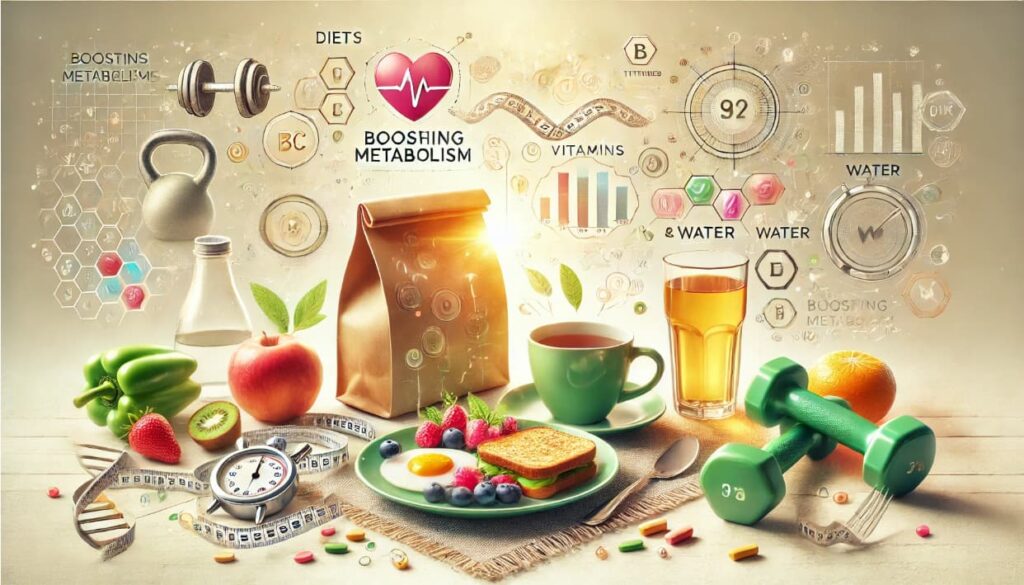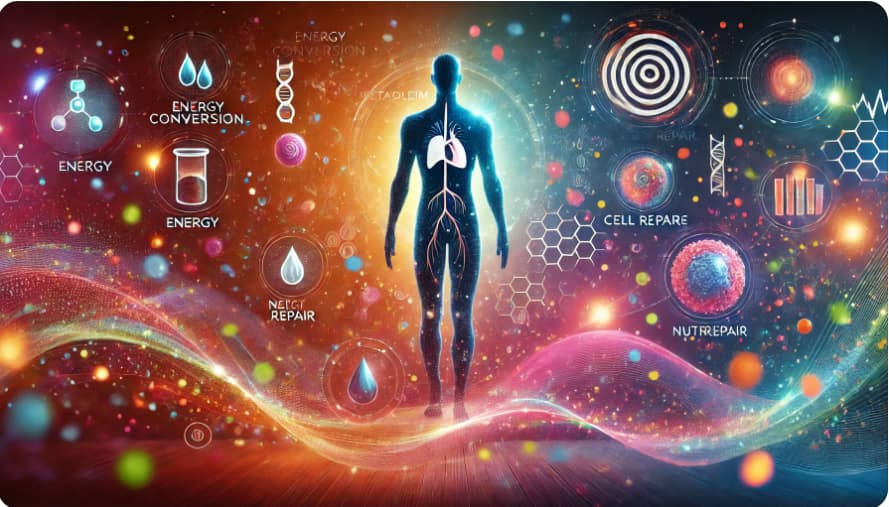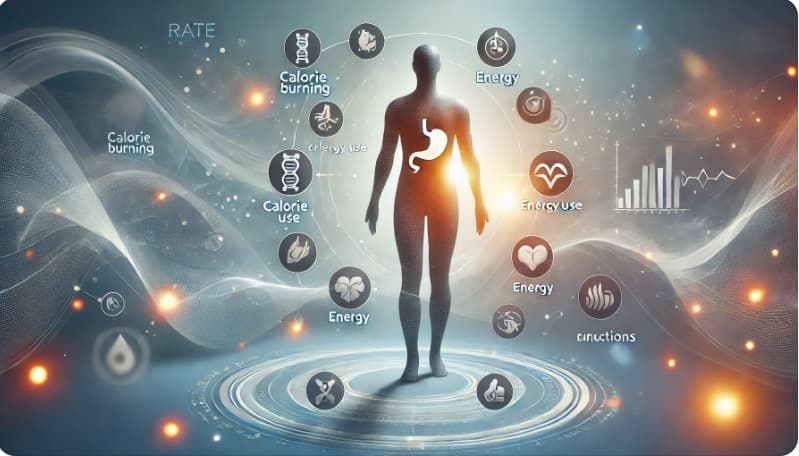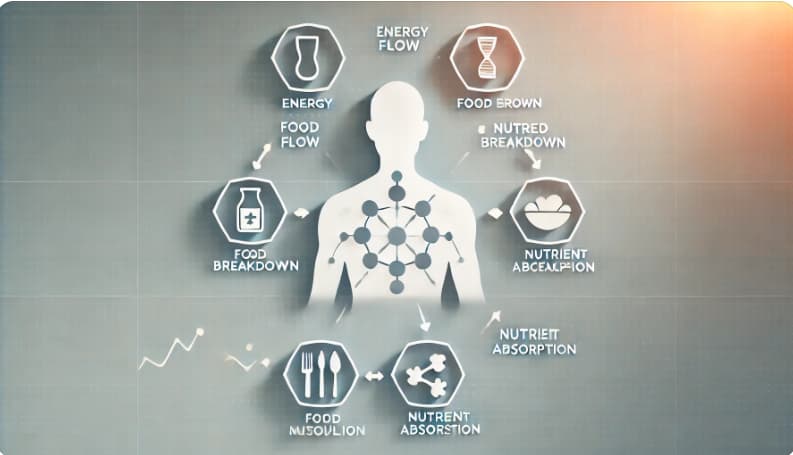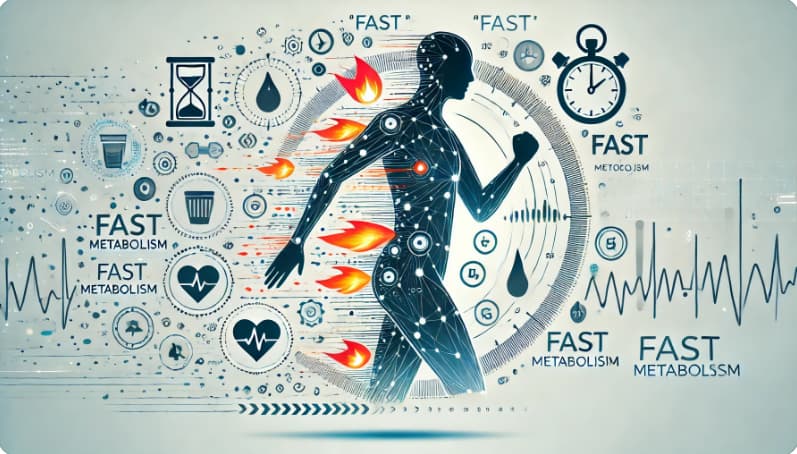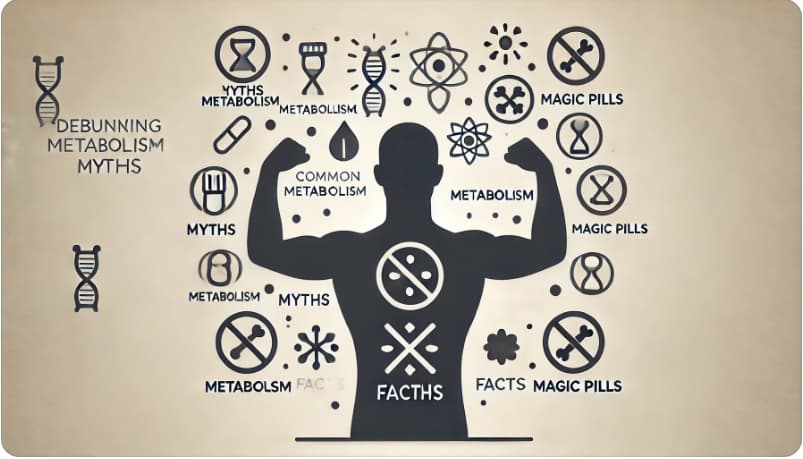What Boosts Metabolism? Imagine your body as a highly efficient machine with metabolism as its engine. Like any engine, it needs the right fuel and maintenance to run smoothly.
Whether you’re looking to enhance energy levels or embark on a journey toward healthier living, nurturing your metabolism is a crucial first step. If you’ve ever wondered what boosts metabolism and keeps it running efficiently, this article will guide you through key strategies.
1. Understanding Metabolism: The Basics
Knowing what boosts metabolism is essential for anyone looking to improve energy levels and overall health. Metabolism is often discussed in the context of weight loss and overall health, yet understanding its function is essential.
At its core, metabolism encompasses all the chemical processes in our bodies that keep us alive, from converting food to energy to repairing cells.
Metabolism influences how effectively we break down food and burn calories. It’s not just about how quickly we burn fat; it’s also about how efficiently our bodies function every day.
This process powers everything we do from breathing and circulating blood to thinking and moving. Boost your metabolism now—limited stock! Get yours here.
2. What is Metabolic Rate?
The metabolic rate is the speed at which your body burns calories to maintain life-sustaining activities. People often talk about “fast” or “slow” metabolisms, referring to how quickly they burn calories.
The resting metabolic rate (RMR) and basal metabolic rate (BMR) are measurements of the energy expended by the body at rest. BMR is influenced by age, weight, genetics, physical activity levels, and diet.
Metabolism Tip: Even when at rest, the body is burning calories. Activities like breathing, circulating blood, and cell repair all require energy, contributing to your daily calorie burn.
3. The Mechanic of Metabolism
Every bite of food we consume is broken down into sugars, amino acids, fatty acids, and other substances our bodies use for fuel. Not all fuel is used immediately—some is stored in the liver or muscles for later use. This delicate balance between energy intake and expenditure keeps our bodies running optimally.
For instance, protein has a high thermic effect, meaning it requires more energy to digest and can help boost metabolism temporarily. This principle, known as the “thermic effect of food” (TEF), highlights how different foods affect energy expenditure.
Key Factors Influencing Your Metabolic Rate
Understanding what influences metabolic rate can help tailor lifestyle changes to support it better. Let’s break down some major factors:
- Age: Metabolism naturally slows with age, especially after 30, due to muscle loss and hormonal changes.
- Genetics: Some individuals inherit a faster metabolism, giving them an advantage in maintaining weight.
- Physical Activity: Regular exercise, especially muscle-building activities, can increase the number of calories burned.
- Diet: Foods high in protein can temporarily boost metabolism due to TEF, while processed foods tend to do the opposite.
- Body Composition: Muscle burns more calories than fat, even at rest, so individuals with more muscle mass often have higher metabolic rates.
Metabolism Fact: Variations in metabolic rate explain why some people eat without gaining weight while others seem to gain weight easily.
4. What Vitamin Boosts Metabolism?
While many factors contribute to a healthy metabolism, certain vitamins play a vital role in optimizing energy production and metabolic function. Vitamins help convert food into energy, support cell function, and aid in the body’s natural repair processes. Here’s a breakdown of key vitamins that have been shown to support metabolic health:
1. Vitamin B
B vitamins, particularly B6, B12, and folate (B9), are crucial for energy production. These vitamins help convert carbohydrates, fats, and proteins into energy that your body can use effectively.
- B6 helps regulate blood sugar levels and contributes to neurotransmitter function.
- B12 supports red blood cell production, which is vital for oxygen transport and energy.
- Folate aids in cellular function and tissue growth, contributing to overall metabolic health.
Metabolism Tip: Incorporate foods rich in B vitamins, like leafy greens, eggs, lean meats, and whole grains, to support metabolic health.
2. Vitamin D
Vitamin D is not only essential for bone health but also for maintaining a balanced metabolism. Low levels of vitamin D have been linked to weight gain and metabolic issues.
- Sources: Sun exposure is a primary source, but you can also find it in fortified dairy, fatty fish, and supplements.
- Benefits: Vitamin D plays a role in insulin response and glucose metabolism, making it beneficial for metabolic regulation.
Pro Tip: Aim to spend 10-30 minutes in the sunlight daily or consider a supplement if you have low vitamin D levels, but consult with a healthcare provider first.
3. Vitamin C
Known for its immune-boosting properties, vitamin C also plays a role in energy production and fat metabolism. It’s a powerful antioxidant that helps reduce oxidative stress, which can impact metabolic function.
- Benefits: Vitamin C helps the body synthesize carnitine, a molecule essential for transporting fatty acids into cells for energy.
- Sources: Citrus fruits, berries, bell peppers, and leafy greens are rich in vitamin C.
4. Iron (Mineral)
While not a vitamin, iron is essential to mention as it supports metabolic function by enabling oxygen transport in the blood, vital for energy production. Low iron levels can slow metabolism and reduce energy.
- Sources: Include iron-rich foods like red meat, lentils, and spinach, paired with vitamin C sources for better absorption.
5. Magnesium
Magnesium supports hundreds of biochemical reactions in the body, including those related to energy production and glucose control.
- Benefits: Magnesium assists in converting food into energy, supporting metabolic health.
- Sources: Include nuts, seeds, legumes, and whole grains for a natural magnesium boost.
5. What Does Having a ‘Fast’ Metabolism Mean?
A “fast” metabolism generally means that your body burns calories more quickly than average, using energy efficiently. This can make weight management easier for some people, as their bodies may naturally burn more calories even at rest.
However, a fast metabolism can also make it challenging to gain weight or muscle, as energy is expended quickly. Understanding this balance can help set realistic goals for metabolism-boosting efforts.
6. Natural Ways to Support and Boost Your Metabolism
When considering what boosts metabolism, there are a variety of lifestyle changes you can make, from dietary shifts to exercise routines.
Now that we’ve laid the foundation, let’s dive into practical ways to support your metabolism. Each method works in synergy to optimize how your body uses energy.
1. Practice Healthy Eating Habits
Your diet can play a significant role in supporting metabolic health. Here are specific ways to incorporate metabolism-friendly habits:
- Incorporate Protein in Every Meal: Protein increases TEF, boosting calorie burn during digestion. Try high-protein meals such as grilled chicken, quinoa salad, or a chickpea bowl.
- Eat Smaller, More Frequent Meals: Some studies suggest that eating smaller, frequent meals may help stabilize blood sugar and avoid metabolic slowdowns.
Pro Tip: Check out our High-Protein Recipes and Meal Plans to get started on adding metabolism-friendly foods to your diet. Don’t miss out! Start your metabolism journey today. Click here.
2. Engage in Weight Training
Building muscle through resistance training enhances the resting metabolic rate (RMR). Muscle tissue burns more calories than fat, so increasing muscle mass results in more calories burned, even when at rest.
- Exercises to Try: Squats, deadlifts, and push-ups are great compound exercises for building muscle.
- Why It Works: Muscle requires more energy for maintenance, creating a natural boost in metabolism.
3. High-Intensity Interval Training (HIIT)
HIIT workouts are short bursts of intense exercise followed by rest periods. This style of training is known to elevate metabolism even after the workout ends due to excess post-exercise oxygen consumption (EPOC).
- Benefits: HIIT improves cardiovascular health and accelerates fat burning.
- Getting Started: Include exercises like sprint intervals, jumping jacks, or cycling at high intensity for 20-30 seconds, followed by rest.
4. Stay Active Throughout the Day
If you have a desk job, aim to break up long periods of sitting, as prolonged inactivity is linked to metabolic slowdown.
- Simple Hacks: Stand up every 30 minutes, take a walk during breaks, or do light stretching to keep your body active.
- Why It Matters: Frequent movement keeps metabolism active and counteracts the effects of sedentary behavior.
5. Quality Sleep
Sleep impacts metabolism by regulating hormone production. Poor sleep can disrupt levels of ghrelin (hunger hormone) and leptin (satiety hormone), leading to cravings and metabolic slowdown.
- How Much is Enough?: Aim for 7-9 hours of quality sleep per night for optimal metabolic health.
- Bedtime Routine: Create a sleep-friendly environment by reducing screen time, dimming lights, and establishing a regular sleep schedule.
6. Stay Hydrated
Water is essential for all metabolic processes. Drinking enough water supports digestion, energy production, and waste removal.
- Daily Goal: Aim for at least 8 cups of water daily, adjusting based on activity levels and climate.
- Boost It Up: Drinking cold water may increase calorie burning slightly, as the body uses energy to warm it to body temperature.
7. Intermittent Fasting
Intermittent fasting (IF) involves alternating cycles of eating and fasting. It has been shown to positively affect metabolic health, weight loss, and hormone balance.
- Popular Methods: 16:8 (fast for 16 hours, eat within 8 hours) and 5:2 (eating normally 5 days, restricting calories 2 days).
- Precaution: Consult a healthcare professional before starting, especially if you have health conditions.
8. Try Green Tea
Green tea contains catechins and caffeine, which may offer slight metabolic benefits. Studies suggest a small increase in calorie burning when consumed regularly.
- How to Use: Sip a cup of green tea in the morning or before workouts.
- Note: Results vary, so while green tea can support metabolism, it’s not a standalone solution.
7. Debunking Metabolism Myths
Not every popular trend for boosting metabolism works. Here’s a closer look at some common myths:
- Myth 1: Eating Late at Night Slows Metabolism: Timing has less effect on metabolism than overall food quality and quantity.
- Myth 2: Metabolism Alone Controls Weight: Lifestyle, physical activity, and diet play significant roles in weight management.
- Myth 3: Certain Foods “Speed Up” Metabolism: While some foods have mild thermic effects, no single food has a dramatic effect on metabolic rate.
8. When to Consult a Healthcare Professional
If you experience unexplained weight gain or loss, fatigue, or other symptoms, consider consulting a healthcare provider. Underlying health issues like thyroid imbalances can impact metabolism and require professional guidance.
Wellness Tip: Keep a journal of lifestyle changes to track their effects on energy, mood, and weight. ake control of your metabolism. Limited offer! Access it now.
9. Sustainable Metabolism-Boosting Strategies
Ultimately, boosting your metabolism isn’t about quick fixes. It’s about adopting sustainable habits that support your body’s natural energy processes. Here’s a quick summary of the effective strategies we’ve covered:
- Healthy Eating: Prioritize protein and regular meals.
- Exercise: Incorporate weight training and HIIT into your routine.
- Move More: Avoid long periods of inactivity.
- Sleep Well: Prioritize quality sleep for hormonal balance.
- Stay Hydrated: Water is essential for metabolism.
- Intermittent Fasting: Consider structured fasting for metabolic benefits.
- Green Tea: Add it to your routine for mild calorie-burning effects. Make it last! Grab this metabolism tool before it’s gone. Claim yours now.
Conclusion – What Boosts Metabolism?
Understanding what boosts metabolism can help you make informed choices that support sustained energy and health. Boosting your metabolism isn’t about following the latest fads. it’s about making lifestyle choices that support your body’s natural processes.
By understanding what influences metabolism and implementing small, consistent changes, you can help your body’s “engine” run more efficiently.
Remember, metabolism varies for everyone, and results take time. Start small, stay consistent, and let these strategies become part of a healthier, energized lifestyle.
Have you tried any methods to boost your metabolism? Share your experiences below, and don’t forget to follow us on social media for more health tips!
Frequently Asked Questions
Q1. Can metabolism slow down as I age?
A. Yes, aging often leads to a slower metabolism due to muscle loss and hormonal changes. Staying active and building muscle can help counteract this.
Q2. Does eating spicy food increase metabolism?
A. Spicy foods like chili peppers contain capsaicin, which can slightly boost metabolism temporarily, but the effect is minor.
Q3. Is metabolism the only factor in weight gain?
A. No, while metabolism is crucial, diet, physical activity, and lifestyle habits also significantly influence weight.
Recent Posts
- How to Gain Weight With a High Metabolism?
- What is a Metabolic Workout? The Key to Fitness Success
- How To Boost Metabolism After 40: Reignite Your Vitality
- Metabolic Vitamins – Boosting Metabolism Naturally
- Endomorph Diet and Workout Plan: Unlocking Success

